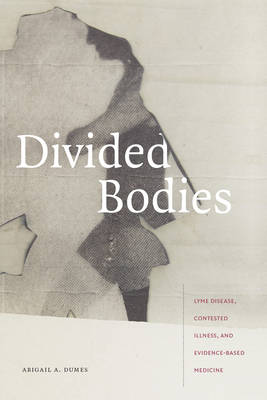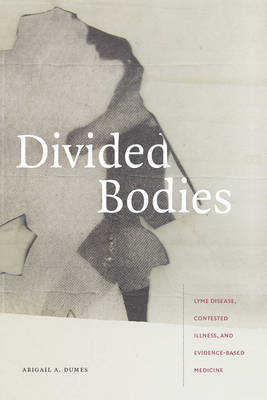
- Afhalen na 1 uur in een winkel met voorraad
- Gratis thuislevering in België vanaf € 30
- Ruim aanbod met 7 miljoen producten
- Afhalen na 1 uur in een winkel met voorraad
- Gratis thuislevering in België vanaf € 30
- Ruim aanbod met 7 miljoen producten
Zoeken
€ 60,95
+ 121 punten
Uitvoering
Omschrijving
While many doctors claim that Lyme disease-a tick-borne bacterial infection-is easily diagnosed and treated, other doctors and the patients they care for argue that it can persist beyond standard antibiotic treatment in the form of chronic Lyme disease. In Divided Bodies, Abigail A. Dumes offers an ethnographic exploration of the Lyme disease controversy that sheds light on the relationship between contested illness and evidence-based medicine in the United States. Drawing on fieldwork among Lyme patients, doctors, and scientists, Dumes formulates the notion of divided bodies: she argues that contested illnesses are disorders characterized by the division of bodies of thought in which the patient's experience is often in conflict with how it is perceived. Dumes also shows how evidence-based medicine has paradoxically amplified differences in practice and opinion by providing a platform of legitimacy on which interested parties-patients, doctors, scientists, politicians-can make claims to medical truth.
Specificaties
Betrokkenen
- Auteur(s):
- Uitgeverij:
Inhoud
- Aantal bladzijden:
- 360
- Taal:
- Engels
- Reeks:
Eigenschappen
- Productcode (EAN):
- 9781478006664
- Verschijningsdatum:
- 25/09/2020
- Uitvoering:
- Paperback
- Formaat:
- Trade paperback (VS)
- Afmetingen:
- 152 mm x 229 mm
- Gewicht:
- 471 g

Alleen bij Standaard Boekhandel
+ 121 punten op je klantenkaart van Standaard Boekhandel
Beoordelingen
We publiceren alleen reviews die voldoen aan de voorwaarden voor reviews. Bekijk onze voorwaarden voor reviews.








